
The Donetsk region of eastern Ukraine has long been in Moscow's sights. Vladimir Putin reportedly wants to freeze the war in return for full control of it.
Russia already controls 70% of Donetsk and nearly all of neighbouring Luhansk and is making slow but steady advances.
I'm heading to the front-line Donetsk town of Dobropillia with two humanitarian volunteers, just 8km (five miles) from Russia's positions. They're on a mission to bring the sick, elderly and children to safer ground.
At first, it goes like clockwork. We speed into the town in an armoured car, equipped with rooftop drone-jamming equipment, hitting 130km/h (80mph). The road is covered in tall green netting which obscures visibility from above - protecting it from Russian drones.

This is their second trip of the morning, and the streets are mostly empty. The few remaining residents only leave their homes to quickly collect supplies. Russian attacks come daily.
The town already looks abandoned and has been without water for a week. Every building we pass has been damaged, with some reduced to ruins.
In the previous five days, Laarz, a 31-year-old German, and Varia, a 19-year-old Ukrainian, who work for the charity Universal Aid Ukraine, have made dozens of trips to evacuate people.
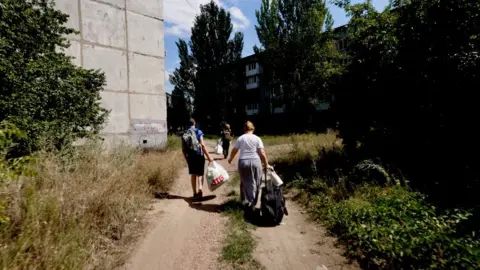
A week earlier, small groups of Russian troops breached the defences around the town, sparking fears that the front line of Ukraine's so-called "fortress belt" - some of the most heavily defended parts of the Ukrainian front - could collapse.
Extra troops were rushed to the area and Ukrainian authorities say the situation has been stabilised. But most of Dobropillia's residents feel it's time to go.
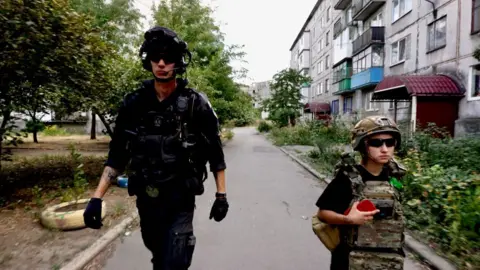 BBC News
BBC NewsAs the evacuation team arrives, Vitalii Kalinichenko, 56, is waiting on the doorstep of his apartment block, with a plastic bag full of belongings in hand.
"My windows were all smashed, look, they all flew out on the second floor. I'm the only one left," he says.
He's wearing a grey t-shirt and black shorts, and his right leg is bandaged. Mr Kalinichenko points to a crater beyond some rose bushes where a Shahed drone crashed a couple of nights earlier, shattering his windows and cutting his leg. The engine from another drone lies in a neighbour's garden.
As we are about to leave, Laarz spots a drone overhead and we take cover again under trees. His handheld drone detector shows multiple Russian drones in the area.
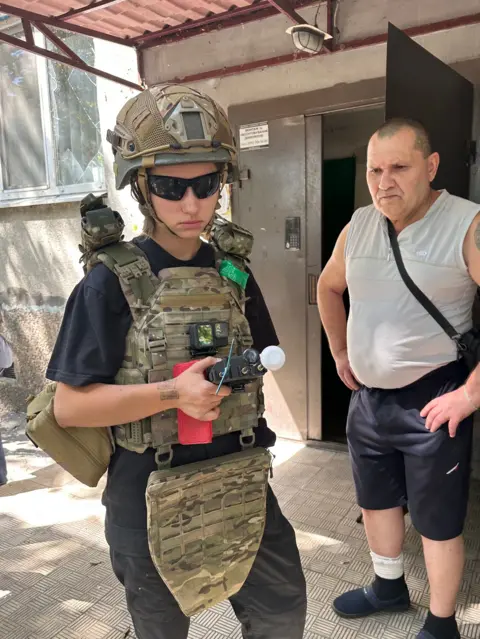
An older woman in a summer dress and straw hat is walking by with a shopping trolley. He warns her about the drone, and she quickens her pace. An explosion hits nearby, its sound echoing off the nearby apartment blocks.
But before we can attempt to leave, there is still another family to be rescued, just around the corner.
Laarz goes on foot to find them, switching off the idling vehicle's drone-jamming equipment to save battery power. "If you hear a drone, it's the two switches in the middle console, turn it on," he says as he disappears around the corner. The jammer is only effective against some Russian drones.
A series of blasts hit the neighbourhood. A woman, out to fetch water with her dog, runs for cover.
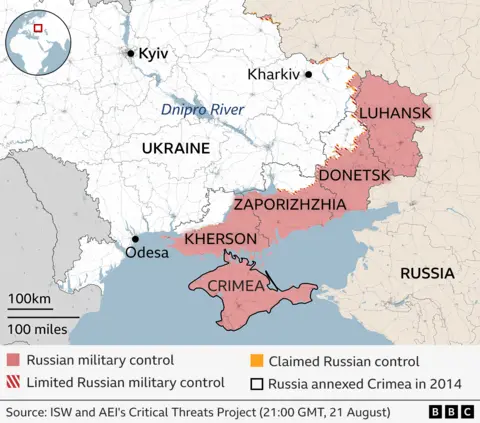
Laarz returns with more evacuees, and with drones still in the air above, drives out of town even faster than he arrived.
Inside the evacuation convoy, I sit beside Anton, 31. His mother stayed behind. She cried as he departed and he hopes she will leave too soon.
In war, front lines shift, towns are lost and won and lost again, but with Russia advancing and the fate of the region hanging on negotiations, this may be the final time Anton and the other evacuees see their homes.
Anton says he's never left the town before. Over the roar of the engine, I ask him if Ukraine should relinquish Donbas - the resource-rich greater region made up of Donetsk and Luhansk.
"We need to sit at the negotiation table and after all resolve this conflict in a peaceful way. Without blood, without victims," he says.
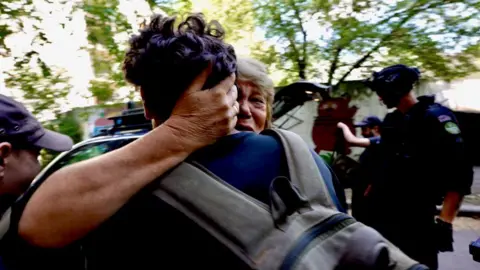 BBC News
BBC NewsBut Varia, 19, feels differently. "We can never trust Putin or Russia, whatever they are saying, and we have experience of that. If we give them Donbas, it won't stop anything but only give Russia more room for another attack," she tells me.
The situation in Donbas is increasingly perilous for Ukraine as Russia slowly but steadily advances. President Volodymyr Zelensky has scoffed at suggestions that it could be lost by the end of this year, predicting it would take four more years for Russia to fully occupy what remains.
But it's unlikely Ukraine will recapture significant territory here without new weaponry or additional support from the West.
This part of Donetsk is critical to Ukraine's defensive. If lost or given to Russia, neighbouring Kharkiv and Zaporizhia regions – and beyond – would be at greater risk.
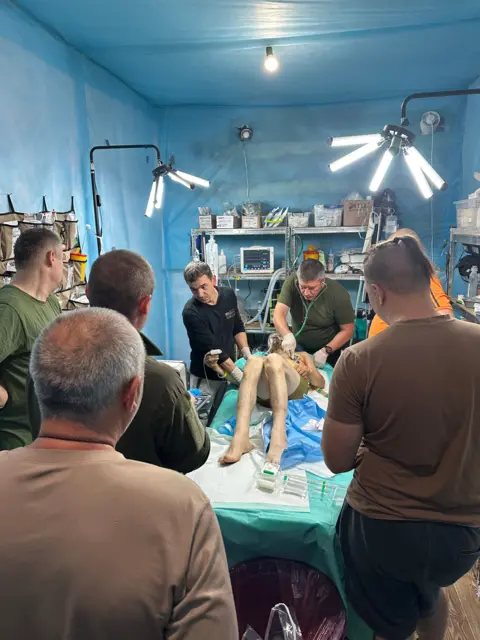
The cost of holding on is measured in Ukrainian soldiers' lives and body parts.
Later on, I drive to a nearby field hospital under the cover of darkness. The drone activity never ceases, and the war injured, and the dead, can only be safely retrieved at night.
Russian casualties are far higher, perhaps three times as much or more, but it has a greater capacity to absorb losses than Ukraine.
The wounded begin to arrive, the cases growing steadily more serious as night stretches into morning. The casualties are from fighting in Pokrovsk, a city that Russia has been trying to seize for a year, and is now partially encircled. It's a key city in Donetsk's defence, and the fighting has been brutal.
The first man arrives conscious, a bullet wound to chest from a firefight. Next comes another man in his forties covered in shrapnel wounds. It took two days and three attempts to rescue him, such was the intensity of the fighting. Next a man whose right leg has been almost blown off entirely by a drone strike on the road from Pokrovsk to Myrnohrad.
Surgeon and Snr Lt Dima, 42, moves from patient to patient. This is a medical stabilisation unit, so his job is to patch up the injured as quickly as possible and send them on to a main hospital for further treatment. "It's hard because I know I can do more, but I don't have the time," he tells me.
After all this carnage, I ask him too if Donbas should be surrendered to bring peace.
"We have to stop [the war], but we don't want to stop it like this", he says. "We want back our territory, our people and we have to punish Russia for what they did."
He's exhausted, casualties have been heavier, dozens a day, since Russia's incursion, and the injuries are the worst the doctors have seen since the war began, mostly because of drones.
"We just want to go home to live in peace without this nightmare, this blood, this death," he says.
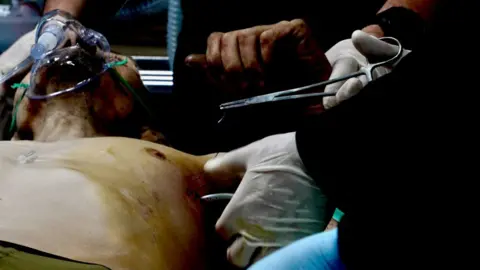 BBC News
BBC NewsOn the drive out that afternoon, between fields of corn and sunflowers, miles of newly uncoiled barbed wire glint in the sunlight. They run alongside raised banks of red earth, deep trenches and neat lines of anti-tank dragon's teeth concrete pyramids. All designed to slow any sudden Russian advance.
It is believed that Russia has over 100,000 troops standing by, waiting to exploit another opportunity like the earlier breaches around Dobropillia.
These new fortifications carved in the Ukrainian dirt chart a deteriorating situation here in Donetsk. What's left of the region may yet be surrendered by diplomacy, but until then Ukraine, bloodied and exhausted, remains intent on fighting for every inch of it.

14 PerFlyer